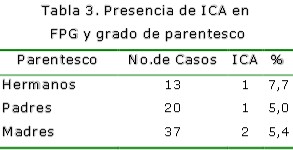Anticuerpos anti-islotes pancreáticos en diabéticos tipo i y familiares de primer grado
Abstract
Se realizó un estudio transversal sobre la presencia de anticuerpos anti-islotes pancreáticos por el método de inmunofluorescencia indirecta con incubación prolongada en familiares de primer grado de niños diabéticos insulino dependientes, de reciente diagnóstico atendidos en el Policlínico de Especialidades Pediátricas de Camagüey, y a un grupo control sin antecedentes de diabetes mellitus realizándole a todos una encuesta previa. Se encontró una alta frecuencia de anticuerpos anti-islotes pancreáticos en los diabéticos tipo 1 de reciente diagnóstico (p<0, 001), en relación con los familiares de diabéticos insulino dependientes (FPG) y controles (80 % vs 5, 7 % y 0, 0 %, respectivamente). Esta frecuencia fue también superior en los FPG en comparación con los controles (p = 0, 045). No se encontró diferencias al relacionar los ICA con el parentesco, historia familiar de diabetes tipo 1 y 2, la edad y el sexo de los FPG. Nuestros resultados indican que los anticuerpos anti-islotes pancreáticos (ICA) son un buen marcador del proceso de destrucción de las células b pancreáticas en la diabetes tipo 1 de reciente diagnóstico y que la presencia de estos en los FPG pudiera identificar a los familiares con una mayor probabilidad a desarrollar una diabetes tipo 1.Downloads

Downloads
Published
How to Cite
Issue
Section
License
Copyright (c) 2015 Pedro Pablo Acosta Valdés, Francisco Varona Rodríguez, José García Sánchez, Beatriz Pérez Cruz

This work is licensed under a Creative Commons Attribution-NonCommercial 4.0 International License.
Copyright: Camagüey Medical Archive Magazine, offers immediately after being indexed in the SciELO Project; Open access to the full text of the articles under the principle of making available and free the research to promote the exchange of global knowledge and contribute to a greater extension, publication, evaluation and extensive use of the articles that can be used without purpose As long as reference is made to the primary source.
Conflicts of interest: authors must declare in a mandatory manner the presence or not of conflicts of interest in relation to the investigation presented.
(Download Statement of potential conflicts of interest)
The Revista Archivo Médico de Camagüey is under a License Creative Commons Attribution-Noncommercial-No Derivative Works 4.0 International (CC BY 4.0).
This license allows others to distribute, to mix, to adjust and to build from its work, even for commercial purposes, as long as it is recognized the authorship of the original creation. This is the most helpful license offered. Recommended for maximum dissemination and use of licensed materials. The full license can be found at: https://creativecommons.org/licenses/












 22 julio 2025
22 julio 2025